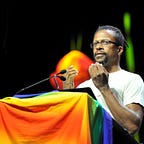What Is the Toll?
I am a minister, I am black and I serve a predominantly white congregation. The definition “white congregation” extends beyond the physical and also appears in priorities and perceptions of the congregation as well. I am not alone. I have many colleagues from a wide variety of non-white backgrounds who have chosen to work, serve, and contribute to Unitarian Universalist and other religious denomination congregations as ministers, DREs, Musicians, Administrators and Building Managers where they are one of only a few or the only person of color on staff. They do what they do because they are people who are committed to spiritual and ethical life and public morality, not because they wish to make a statement on multi-culturalism…even though they are sometimes hired for that reason. Their lived experience, not their jobs make them the embodiment of justice. What I hear from most of them is that they also are aware that there is an existential cost to having made this dedicated choice.
I have to ask, as I weigh the fact that both my formation and my called ministry have been entirely shaped and colored by the ongoing government sanctioned public lynching of black men by law enforcement, when is it too much? What has the toll been on me and others like me? Everyone talks about self-care, but no one ever put self-care in the context of epidemic violence against people of color and viral images of black lives being extinguished. No one ever taught a seminary class in self-care as an antidote for whiteness. How do those of us who aren’t primarily among communities of color accept that self care is not abdication of some bizarre “duty” to do 24/7 race work.
So many of us have to listen patiently as our white communities try to understand what to “do” and we have to give guidance and instruction as to what is appropriate in terms of bearing witness to the ongoing tragedy. Too often we are asked to lead protests, sing songs, create rituals, craft messages etc. that are all shaped around a white identity that is desperately searching for a place in the racial reckoning of our day. There is a brutal contrast between this and coming together with our community of color to raise voices, mourn, celebrate, rage and resist. In those spaces we don’t have to translate, or explain. We are not the show in those spaces because no one is performing. In those spaces we are living out loud in real time. It is a loss to not be in those spaces at this time. It is no wonder that there is also a time when we must make it clear to our white communities that this kind of performance is sometimes simply too much to ask even though putting up the hand and saying “I just can’t do this for you right now” is more labor; more race work.
I have to wonder what it is like for my white ministerial colleagues who wake up in the morning and don’t have an internalized sickened dread at turning on the news or opening their email. Who won’t see themselves lynched every few months; who haven’t had to talk about, think about, let alone be the poster child for racial reckoning with their congregations. I wonder what it is like to hear the helplessness of well-meaning liberal folks in their congregations who want to “do something” having also felt helpless. I wonder what it is like to be able to decide to go to a march or protest and feel “satisfied” when you leave as opposed to feeling like its just another day at the office and knowing you will be there again.
And yes, I fully well know it is more complex than that but I have to wonder what it is like to be white in this time.
I am a minister, I am black and I serve a predominantly white congregation. The definition “black” also extends beyond the physical and appears in the priorities and perceptions I carry as well. I cannot see a black person under 30 gunned down without thinking he could be my child; I cannot witness elders in the civil rights movement who themselves were children when they began to fight, starting to die off without thinking will I go to my grave with this business unfinished too? I cannot hear black voices crying for justice over, and over and over and over again at march after march, rally after rally, vigil after vigil and not hear myself preaching and writing every week, every day in subtle and sometimes not so subtle ways saying this is F**KED UP…JUST FIX IT!
What un-reimbursable toll is being extracted from me and every person of color, every day as we try to explain, justify, fix and retrofit whiteness when ultimately, it is up to white people to cure whiteness?
-ALD
Originally published at http://spirituwellness.com on August 28, 2020.
